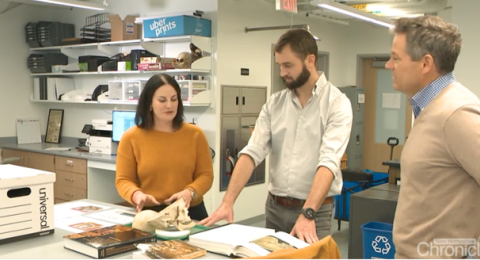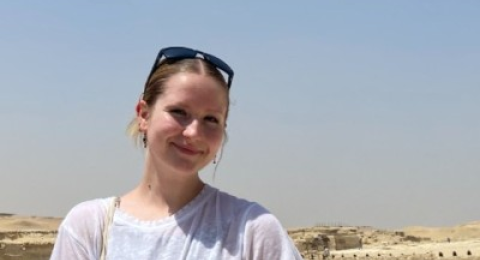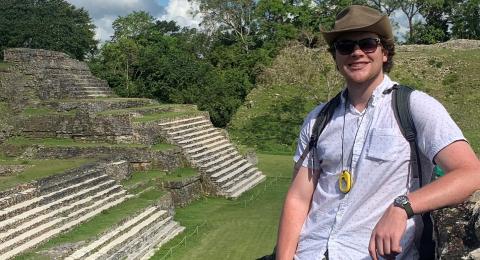The Anthropology major at UNH provides students with a broad overview of diverse peoples and cultures. The anthropology degree both prepares students for graduate-level studies and serves as a foundation for a wide range of careers. With backgrounds in anthropology, our students become teachers, social workers, public policy experts, forensic investigators, health practitioners, primatologists, international business executives, and community and economic development specialists, as well as pursuing various other careers.
What is anthropology?
What does it mean to be human? That’s the question you’ll try to answer while pursuing a degree in anthropology. You’ll study human beings and past and present societies throughout the world. You’ll gain a broad overview of diverse peoples and cultures and acquire critical thinking skills, preparing you for today’s increasingly globalized world and job market.
Why study anthropology at UNH?
You can take hands-on courses in archaeology and socio-cultural, applied, medical, biological and forensic anthropology, and work with faculty on academic and applied research projects in the Americas, Europe, Africa and Central and Southeast Asia. Internships in anthropology provide supervised practical experience, and a study-away program in Belize offers hands-on archaeological experience.
Potential careers
- Archaeologist
- Business anthropologist
- Community and economic development specialist
- Forensic investigator
- Museum curator
- Public health expert
- Teacher
Curriculum & Requirements
Anthropology asks the question: What does it mean to be human? We answer this fundamental query with a global perspective on the human condition as students explore both the similarity and diversity of human experience. Through courses that cover a wide range of societies throughout the world, we investigate the human condition, past and present. Introductory courses provide an overview of the fields of anthropology: social and cultural anthropology, archeology, physical anthropology and linguistics. More advanced courses provide the opportunity for students to pursue intensive study of particular topics in cross-cultural perspective. The department emphasizes critical thinking and writing skills and encourages close faculty/student contact in seminar courses and at the upper level. Students, in consultation with their academic adviser, have the opportunity to take courses in other departments that complement specific foci in anthropology.
At this time of increasing globalization, anthropology provides students with a broad overview of diverse peoples and cultures. Majors are therefore well prepared to live in a rapidly changing world. The major both prepares students for graduate-level studies and serves as a foundation for a wide range of careers. With backgrounds in anthropology, our students become teachers, social workers, public policy experts, forensic investigators, health practitioners, primatologists, international business executives, and community and economic development specialists, as well as pursuing various other careers.
To declare a major in anthropology, students must have completed at least one introductory level anthropology course at the 400 or 500 level with a grade of C or better.
Below is a general degree plan that we recommend anthropology majors follow as they plan their course schedules for their major course requirements over their four years at UNH. This general plan provides a recommended pace and appropriate order for the core courses offered in the major.
| First Year | ||
|---|---|---|
| Fall | Credits | |
| ENGL 401 | First-Year Writing | 4 |
| ANTH 411 | Global Perspectives on the Human Condition: An Introduction to Anthropology | 4 |
| Discovery Course | 4 | |
| Language Course | 4 | |
| First Year Seminar | 1 | |
| Credits | 17 | |
| Spring | ||
| ANTH 412 or ANTH 415 | Broken Pots and Buried Cities: Introduction to World Archaeology or The Human Story: Evolution, Fossils and DNA | 4 |
| ANTH 500 or ANTH 501 | Peoples and Cultures of the World or World Archaeological Cultures | 4 |
| Language Course | 4 | |
| Discovery Course | 4 | |
| Credits | 16 | |
| Second Year | ||
| Fall | ||
| ANTH 513 or ANTH 514 | Ethnographic Methods or Method and Theory in Archaeology | 4 |
| ANTH 500-level Course | 4 | |
| Discovery Course | 4 | |
| Discovery Course | 4 | |
| Credits | 16 | |
| Spring | ||
| ANTH 600-level Course | 4 | |
| Discovery Course | 4 | |
| Course selected in consultation with advisor 1 | 4 | |
| Course selected in consultation with advisor 1 | 4 | |
| Credits | 16 | |
| Third Year | ||
| Fall | ||
| ANTH 611 | History of Anthropological Theory | 4 |
| ANTH 600-level or higher Course | 4 | |
| Discovery Course | 4 | |
| Course selected in consultation with advisor 1 | 4 | |
| Credits | 16 | |
| Spring | ||
| ANTH 600-level or higher Course | 4 | |
| Discovery Course | 4 | |
| Course selected in consultation with advisor 1 | 4 | |
| Course selected in consultation with advisor 1 | 4 | |
| Credits | 16 | |
| Fourth Year | ||
| Fall | ||
| ANTH 750 or ANTH 785 or ANTH 797 | Islam and Gender: Gendered Lives of Muslims or The Anthropology of Dreams and Dreaming or Advanced Topics | 4 |
| Course selected in consultation with advisor 1 | 4 | |
| Course selected in consultation with advisor 1 | 4 | |
| Course selected in consultation with advisor 1 | 4 | |
| Credits | 16 | |
| Spring | ||
| ANTH 699 | Senior Thesis (optional) | 4 |
| Course selected in consultation with advisor 1 | 4 | |
| Course selected in consultation with advisor 1 | 4 | |
| Course selected in consultation with advisor 1 | 4 | |
| Credits | 16 | |
| Total Credits | 129 | |
- 1
Students can explore a second major, minor or general electives.
Degree Requirements
All Major, Option and Elective Requirements as indicated.
*Major GPA requirements as indicated.
Major Requirements
Majors must complete a minimum of 40 credits in anthropology with grades of C or better and in accordance with the below requirements. The required minimum overall GPA in major coursework is 2.0.
| Code | Title | Credits |
|---|---|---|
| Required Courses | ||
| ANTH 411 | Global Perspectives on the Human Condition: An Introduction to Anthropology | 4 |
| ANTH 412 | Broken Pots and Buried Cities: Introduction to World Archaeology | 4 |
| or ANTH 415 | The Human Story: Evolution, Fossils and DNA | |
| ANTH 500 | Peoples and Cultures of the World | 4 |
| or ANTH 501 | World Archaeological Cultures | |
| ANTH 513 | Ethnographic Methods | 4 |
| or ANTH 514 | Method and Theory in Archaeology | |
| ANTH 611 | History of Anthropological Theory | 4 |
| Electives | ||
| One additional course numbered 500 or above | 4 | |
| Three additional courses numbered 600 or above | 12 | |
| Capstone Requirement | ||
| ANTH 750 | Islam and Gender: Gendered Lives of Muslims | 4 |
| or ANTH 785 | The Anthropology of Dreams and Dreaming | |
| or ANTH 797 | Advanced Topics | |
| Total Credits | 40 | |
Additional Information
Students declaring the major in anthropology are expected to make steady progress toward fulfillment of major requirements. Typically, this means taking at least one ANTH course per semester until all of the requirements have been met. Very rarely, and only in specific circumstances such as a complex transfer of ANTH-related credits from another school, will an exception to this policy be made and only in student consultation with their advisor.
Candidates for any UNH degree must satisfy all of the University Discovery Program requirements in addition to satisfying the requirements of each individual major program.
Discovery Program Requirements
Anthropology majors may use one major-required ANTH course to satisfy one Discovery category requirement. These only include: ANTH 411, ANTH 412, ANTH 415, ANTH 500, or ANTH 501.
Capstone Requirement
The Capstone Requirement for the anthropology major also fulfills the Discovery Capstone Requirement, and it must be fulfilled in a Seminar format in any one the following courses: ANTH 750, ANTH 785, or ANTH 797. Students may not substitute ANTH 700 or ANTH 795, ANTH 796 courses for their Capstone Requirement, although these can count as electives for the major.
Bachelor of Arts Language Requirement
Anthropology majors must also satisfy the UNH Bachelor of Arts Language requirement. Anthropology majors may take American Sign Language to satisfy the language requirement.
Interdisciplinary Dual Majors or Minors
Many anthropology majors choose to pursue interdisciplinary dual majors or minors at UNH that cross-list ANTH courses, including Justice Studies (JUST), Humanities (HUMA), Sustainability (SUST), International Affairs (IA), Global Studies (GS), and Forensics. Up to eight credits of ANTH courses (normally two courses) will be permitted to count toward both the anthropology major and the dual major program. Students must carefully plan ahead with their advisors in both majors. Up to one (1) course, internship, or experience not based in Anthropology may be counted as an elective for the Anthropology major, and only with the approval of the student's advisor and department chair.
Study Abroad
Students are also encouraged to explore study abroad options through the UNH Global Education Abroad office. Anthropology majors may acquire up to eight credits (normally two courses) toward their major requirements while studying abroad. Additional courses can be accepted for general credits at UNH. Majors must complete ANTH 513 or ANTH 514, ANTH 611, and their 700-level Senior Seminar on-campus. These cannot be completed on study abroad.
Internships
Internships (ANTH 700, 1-4 credits) and independent study courses (ANTH 795 / ANTH 796, 1-4 credits) are supervised primarily by a faculty member and are developed mutually between a student and faculty. Students should have previously taken at least one course with them, and unless faculty have a grant or an external funding partner, internships for credit that are primarily directly by faculty are not paid. To support their research and supplies related to internships or independent studies, students should seek out opportunities from the Hamel Center for Undergraduate Research. Students are encouraged to meet with UNH Career and Professional Success (CaPS) to explore paid, pre-professional internships with organizations outside of UNH, such as local businesses, nonprofits, and government agencies. Additionally, students should contact a faculty member to discuss the possibility of receiving academic credit or secondary supervision for their internship.
Honors-in-Major
An Honors-in-Major option is available and separate from the Hamel Honors & Scholars College options. Honors-in-Major requires completion of ANTH 699 Senior Thesis. Students who decide to undertake Honors-in-Major take ANTH 699 Senior Thesis for two semesters for eight credits total, but this only counts as one ANTH 600-level elective toward their degree. Exceptions may be made for undertaking Hamel College-related Honors Senior Thesis (ANTH 699H Honors Senior Thesis) which is supervised by Anthropology faculty but may be taken once for four credits. Please consult with both the Hamel Honors & Scholars College directors and your Anthropology advisor.
Program Learning Outcomes
- Demonstrate ability to conduct anthropological research: to collect primary and secondary source data in the observation, documentation, or excavation of human actions, languages, remains, and or material artifacts.
- Master the ability to write with an anthropological lens: to critically analyze data with respect to historical and current anthropological theories and perspectives, and to construct persuasive arguments.
- Exhibit skills in presentation of anthropological research: in writing (ethnography, technical reports, and other genres), inter-personal and public speaking, and or data visualization (graphic illustration, exhibition, mapping, or modeling, for example).
- Demonstrate the knowledge or ability to collaborate with research partners and communities as part of a commitment to public, applied, engaged, or activist anthropology and archaeology.
- Demonstrate the ability to think comparatively about diversity and inequality across the global as well as within a specific social context, and to apply anthropological methods, perspectives, and theories to the world around them.
Explore Program Details
Senior Thesis Option
The Department of Anthropology offers students the option of completing a senior thesis. The senior thesis is not a task to be undertaken lightly. Generally, the thesis option is for those students who in the course of their undergraduate careers have developed a deep and sustained interest in a particular topic of anthropological interest. A thesis topic may be developed independently by the student or it may be linked to the on-going research project of a faculty member. It is assumed that a student undertaking a thesis already possesses a level of competence and independence well beyond that required for the completion of established courses. Of special importance is a student's ability to independently conduct library research in order to establish what has previously been written regarding their topic. It is also assumed that the student has given careful thought to choosing a thesis advisor based on knowledge of the areas of expertise and interest possessed by members of the faculty in the Department of Anthropology. Senior Thesis Planning should begin in the Junior Year.









